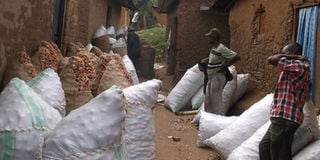Rwahi: Where onion farmers reap big

Onions packed in sacks for the market. Right: Sorting the harvested onions. PHOTO BY PEREZ RUMANZI
What you need to know:
This small town supplies many urban centres including the capital city, Kampala, with onions. Almost all economic activities are centred around this business.
Rwahi, a small town at the edge of Ntungamo District in Katooma Parish, Kayonza Sub County, Rushenyi County is famous for onion growing and trade.
From Rwentobo up to Muhanga hill, the area is covered by onion gardens. Only a small percentage of the land is used for other food crops. It is common to find several lorries there loading onions destined for urban centres like Mbarara, Masaka and Kampala.
For over 50 years, the people in Rwahi have been dependent on onions for their income and livelihood.
Two seasons
Justus Besisira, 58, a resident of Katooma II, has been growing onions for 34 years. He says, “I followed what others were doing. It’s a tradition here. It’s from onions that we get our survival. It’s where we get money to feed our families.”
From onions, the father of six gets money for school fees for all his children, including those in higher institutions of learning. He gets more than Shs20m every year with Shs8m being profit.
Onions are produced twice a year. The first season is from September to December while the second season runs from March to June. Farmers wait for three months for the onions to mature.
There is no much watering of gardens after planting as, in most cases, it is within the rainy seasons.
From an acre of onions, a farmer gets about 20 sacks and sells each at between Shs150,000 and Shs200,000.
There is a lot of labour involved in planting and maintenance of the gardens, which raises issues of children and youth neglecting other activities like going to schoool.
Benefits and challenges
Steven Sabiti Rubegyemera, Katooma parish chairperson, points out the authorities encourage them to pursue their education but acknowledges the downside of the thriving onion business.
“We have school dropouts because of onion farming. When these young people get money, they see no reason to continue schooling,” he says.
The other challenges include occasional food shortages as most of the land here is used to grow onions and less of other food crops.
Insecurity and petty crime also tends to rise when there is no onion-related activity.
But Rubegyemera affirms that onion growing is the major economic activity and many people have earned enough money to start other enterprises.
“There are people who own big houses, they drive good cars and have big businesses both here and in Kampala. Onions have made people prosper,” he says.
Gordon Barungira, a businessman dealing in onions across the country, recalls that he started growing onions at an early school-going age.
“I now have capital of over Shs 200m. I started from onion growing; I grew onions for 22 years. Now, I buy from those who have harvested and I sell to other dealers in Kampala. It is a profitable business. I have made my family happy, built a good house; I have five lorries [bought with proceeds from] onions,” he says.
Other investments
At Rwahi trading centre, when it is harvest time, men, women and children are all involved in sorting and packing onions into portable clusters for hawking on buses and travellers. Others pack them in sacks for loading onto lorries for far away markets.
Constance Katushabe, an onion hawker, says she earns Shs20,000 per day from hawking onions.
The biggest clients for the Rwahi onions are middlemen who sell them in Kampala, mostly in Nateete market and to traders who export them to Kenya and South Sudan.




